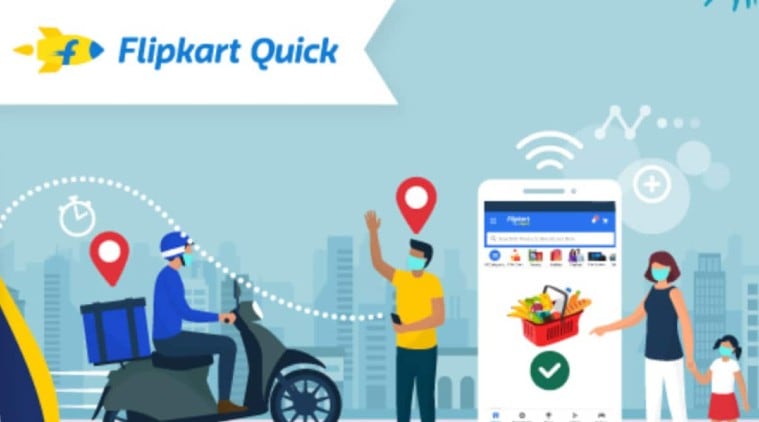Flipkart Quick, 90 min grocery delivery service: All you need to know
Flipkart has launched a new hyperlocal service, called 'Flipkart Quick'. Here's everything you need to know.

Flipkart has launched a new hyperlocal service, called ‘Flipkart Quick‘. The company claims that the service is aimed at providing customers with unmatched customer experience with its “wide selection, top-class quality and a new location mapping technology framework.” It states that the hyperlocal delivery model will help it tap new consumers by widening the accessibility of products and ensuring quick delivery using Flipkart hubs, where people can also place their orders.
Let’s take a look at a few questions you might have about the service.
What type of products will be made available via Flipkart Quick?
The company claims that with Flipkart Quick, it will be able to deliver consumers a handpicked assortment of more than 2,000 products. Categories of products made available will vary from Grocery, Fresh, Dairy, Meat, Mobiles, Electronics Accessories, Stationery Items and Home Accessories in the first phase. The company will expand its product categories in later stages.

Flipkart on Tuesday announced the launch of its 90-minute hyperlocal delivery service that will offer customers with a range of over 2,000 products in categories including grocery, dairy, meat, and stationery items. Called Flipkart Quick, the new offering will initially be rolled out in Bengaluru, though it will expand to six other cities in India in the next few months. The latest service by Flipkart will be available alongside its existing Supermart store that is meant specifically for groceries.
Customers purchasing items through Flipkart Quick will have a minimum delivery fee of Rs. 29, and their orders will be delivered between 6am to midnight. The online marketplace will offer the options to either choose to order with delivery in the next 90 minutes or book a two-hour slot to let customers pick their convenient delivery model.
Flipkart Quick will not be limited to the products that the company already has on its portal. Instead, it will also serve new categories including dairy items, fresh fruits, vegetables, and meat that will be provided through various local sellers and supply chain partners. Flipkart also claims that the new service will not rely on a traditional pin-code system model to identify delivery locations in an area and use an “advanced technology” for location mapping.
“This technology promises to not only speed up the last mile process, but also bring more accuracy to the address mapping system, hence avoid chances of mis-match or re-attempts,” the company said in a statement.
Flipkart claims that its new service would help digitise local kirana stores and shopkeepers in the country. However, it will initially be limited to select locations in Bengaluru, including Whitefield, Panathur, HSR Layout, BTM Layout, Banashankari, KR Puram, and Indiranagar.
“While we start with our dark store (no-walkin) model, wherein we enable sellers to store inventory close to the consumer; this model has the potential of encouraging local entrepreneurship and enabling new business strategies and partnerships,” said Sandeep Karwa, Vice-President, Flipkart.
Flipkart Quick seems to be based on a model similar to what Amazon adopted for its Prime Now service that it ultimately shut down earlier this month and integrated its experience within the Amazon Fresh branding. It is also another move by the Walmart-owned company to counter Reliance Industries' JioMart that is so far limited to groceries but has plans to enter electronics, fashion, healthcare, and pharmaceutical retail in the coming months.
Potential in hyperlocal deliveries
India's hyperlocal market has the potential to exceed Rs. 2,306 crores by 2020, according to a pre-COVID estimate by Ken Research. The COVID-19
pandemic has also drastically impacted e-commerce companies and pushed
them towards new business models to retain their presence in the
country.
arlier this month, Flipkart acquired Walmart's India business to launch a wholesale market for kiranas and other small enterprises in the country. Amazon India also recently expanded the Amazon Pantry business in over 300 cities to expand the delivery of groceries and other essential items through its online marketplace.

Post a Comment
If you have any doubts, please let me know